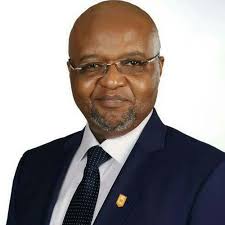Edifying Elucidations BY OKEY IKECHUKWU
He is at once a teacher, a student of life, a mentor without borders and a “gardener” who has water can at all times for nurturing people; professionally and otherwise. He is also a man of great insight and professional competence, as well as a moderator of the values of self-development for those who really understand him. It is quite possible that those who really understand him are not many. He is his own man and rarely tries to explain or justify, himself when confronted with a certain level of philistinism in people. But he always tries to do the best he knows at all times, insisting on excellence for as long as it lies in his power to enforce it. Bonuola does not make any concessions to journalistic mediocrity. He takes no prisoners in maintaining that the citadel of wisdom must not succumb to the assaults of folly. He is bold, unbelievably heroic, but in a most unobtrusive way.
Curiously, Ladbone, as he is fondly called in media circles, does not raise his voice to make his point at any time. He is generally soft-spoken, relying on truth and logic as the final arbiter when issues arise calling for diverse perspectives. Not even when he is the lone defender of a point of view in a fully constituted Editorial Board meeting. What he does not push with the decibel of his voice, he pushes with the unassailable rigour of his submissions.
The other week Mr Lade Bonuola, former Managing Director of The GuardianNewspaper and Nigeria’s Journalist’s journalist, received the “Lifetime Award for Journalistic Excellence” from the Wole Soyinka Centre for Investigative Journalism. This is not one of those popular awards, for which all journalists apply, or make submissions. In these latter cases, the interested journalists would usually respond to the advertisements by sending in a certain number of what they consider their best-published works, for evaluation. Such submissions are then collated for all contestants and assessed.
Thereafter, winners are determined and announced. And, mind you, these awards are highly valued and cheerfully celebrated. They are also sometimes used to rate journalists. But the question remains: “What happens when some of the very best in the profession do not respond to such calls for submission of articles and write-ups”? Does that affect who, or what, they really are? But we are digressing.
I first met Mr Bonuola through the late Mr Martins Itotoi. The latter, though an accomplished public figure and about twice my age at the time, was my student at the University of Lagos, where I was a lecturer in the Departmental Philosophy. He was an Evening Law Student from the Faculty of Law and was among those I taught Critical Thinking and Logic, Philosophy of Law and some aspects of Jurisprudence. The much older Itotoi repeatedly pressured me to visit the Managing Director of The Guardian with him. Though a few of my articles had been published in The Guardian before then, and I had also appeared a couple of times in The African Guardian weekly magazine, I really did not see any need to visit the head of the organisation. But Itotoi’s age, the fact that he always meant well and seemed to hold me in such high esteem made me acquiesce out of politeness. So, we went to visit Mr Bonuola.
The latter received us with such joy, thanked Itotoi and then excused himself from Itotoi and some four other people in his office and went out with me. He personally took me round The Guardian premises. He showed me the library, the press, the newsroom, the Editorial Board room, explaining all the while the role of each of these in the organisation. While we were at it, one or two people would seek him out about some urgent matter; but he would tell them that the matter should wait until he was done. When we finally returned to his office, he dealt briskly with the people there, thanked Mr Itotoi again and, there and then, told me that I was ripe for The Guardian Editorial Board and that I was welcome to take up the existing vacancy on the Board.
Déjà vu! This sort of thing has been my experience ever since I left university. I told him that I did not make any application and he said he knew. Then he repeated his assessment of me and said it was up to me to accept the offer and get a letter of appointment or reject it.
I still demurred and had to explain myself. “Sorry sir, but I do not jump at what people call ‘opportunities.’ It will only take one wrong step for someone to ruin his life. I only do what comes from my spirit, not just what offers a means of livelihood.” He interrupted with “certainly! Oh, certainly!” maintaining a subtly searching and unaffected steady gaze that neither tried to persuade nor plead. I continued: “I always pray for clarity in situations like this, so I would like to take time to know what The Guardian is about and make sure that joining the organization is the next and right step for me at this point in my life.” He merely smiled agreement and said “indeed. Take your time.” That was how I became a visiting member of The Guardian Editorial Board, in the first instance.
Three months later, I walked into Mr Bonuola’s office and said I was ready to join the Board. I was given a letter of appointment within five minutes of entering his office. It was also in this same manner of headhunting that Ladbone sought out Uthman Shodipe who was in the Daily Times and, to the latter’s astonishment, offered him a job on The Guardian Editorial Board. The story is the same for scores of other individuals, including even those he “poached” from the Diaspora. Truth is: the pages of The Guardian offered me a much wider “classroom” and the Editorial Board was made up of people of such robust exposure, pedigree and self-certainty that it offered the vitality I sought, but saw receding, from the university system.
Bonuola’s recent recognition does not fall within the sometimes-puerile hunting for recognition that has now come to characterise much of journalistic and other professional paths. Many do not send in an entry in response to some of this fad that has surreptitiously replaced independent and objective industry evaluations. We now have, all over the world, organisations that started off as custodians of professional values and then morphed repeatedly until they began to progressively outsource the very roles they set up shop to play. It is all thanks to superficiality, a growing culture of laziness at the level of gatekeeping and a desperate desire for accolades by a fast-food generation with a low attention span.
In what must have been a very demanding and thankless job for over 40 years, Lade Bonuola became a phenomenon in the newspaper industry; even as a sub-editor in the Daily Times; of which he later became features editor. He named his column ‘Caught Out’ and used the penname Ladbone, drawn from part of his first and last names. The column sought out common grammatical, syntactical and even factual errors in all the newspapers of the period. None was spared. It was an ombudsman’s ombudsman role of sorts that he inflicted on himself therewith. He was to later rise through the ranks and become Editor of the paper. He ended up part of the distinguished breed of media men involved in setting up the first Newspaper Editorial Board of Substance and stature in Nigeria in the Daily Times.
Then he left as part of that seminal team that birthed The Guardian Newspapers in the early 80s. This brought about a new, fragrant and futuristic era of the print media journalism in Nigeria. The newspaper, of which he was the pioneer editor from 1982-1988, quickly outclassed others in content and pedigree, to emerge the Flagship in the media firmament. He became Managing Director of the group a year later. A position he held until 1999. While at The Guardian, he projected such legal luminaries and public figures who added value to society as Frederick Rotimi Alade (FRA) Williams, Abdul-Ganiyu “Gani” Oyesola Fawehinmi, Kehinde Sofola. He introduced “Cause List” in The Guardian, the first in any Nigerian newspaper; as well as “Flight Guardian”, under which the flight schedules of all national carriers were published.
His interest and partiality for, spiritual and “religious” matters stemmed from his understanding of the fact that it is with knowledge, correct knowledge, that man live well on earth. He had high regard for Enoch Adeboye, the General Overseer of Redeemed Christian Church of God. The latter’s significant public visibility via the media, especially his column “Sunday Worship”, in The Guardian, had the instrumentality of Ladbone behind it. To be fair to The Guardian readership, and balance the religious plurality of our society, Bonuola got a popular Muslim cleric to write “Friday Worship.” He sought out one of Nigeria’s pioneering women writers, Mabel Segun (Nee Imoukhuede), for the children’s page. “Motoring Guardian,” for do-it-yourself (DIY) tips on car maintenance, was also born under his watch. In fact, this particular beat made it necessary for the organisation to seek out automobile engineers around the neighbouring Ladipo area to sustain the page and keep it contemporary.
From The Guardian, Bonuola co-founded The Comet and served as the first Managing Director of the group, before becoming publisher of the Nigerian Compass. He is currently the Chairman, VerityHeights Bureau Limited, an online publication that seeks to deepen our understanding of life. His 2020 Lifetime Award for Journalistic Excellence is well deserved, given his outstanding impact on Nigerian journalism and generations of journalists, as well as his contributions to the growth of “newspapering’ in Nigeria.
THISDAY




